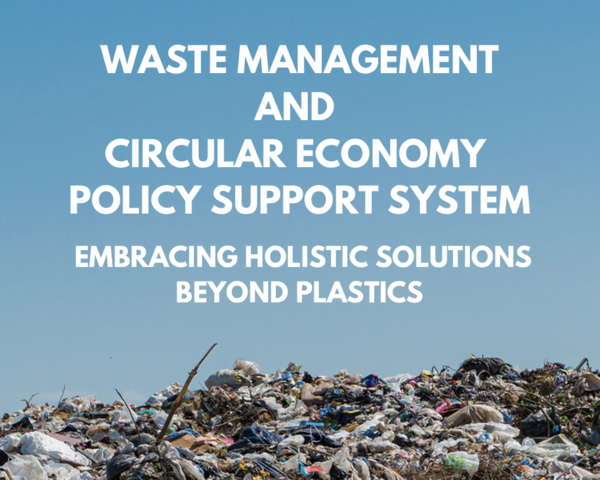[2024] Side Event at the Fifth Session of the Intergovernmental Negotiation Committee (INC-5)

Documents
Concept Note and Agenda (updated as of 3 December 2024)
Background
Plastic pollution has emerged as one of the most pressing environmental challenges of the 21st century, with far-reaching impacts on ecosystems, economies, and human health. Since the 1950s, plastic production has surged, creating a waste stream polluting land, seas, and air, with millions of tons entering the world’s Oceans annually.
The environmental and social costs of plastic waste are not equally distributed. Developing countries, particularly those with limited waste management infrastructure, often bear the brunt of plastic pollution. Low-income countries face particular challenges, with approximately 90% of waste discarded in unregulated dumps or burned openly and limited access to finance to tackle this challenge.1 Inadequate data underestimates this waste crisis and limits the reach and impact of policy for many low-income countries and the ability to address negative environmental externalities.
Despite growing awareness, projections show plastic production could triple by 2050 without coordinated global action.3 The Global Plastics Treaty presents a historic opportunity to tackle plastic pollution, provided national capacity, policymaking, data and finance is strengthened to ensure the means of implementation for better waste management.
However, we still have hope to rescue these ambitions by 2030, provided we swiftly accelerate our efforts. At this year’s HLPF, 36 countries presented their Voluntary National Reviews with a focus on showcasing national progress towards the 2030 Agenda.
This side event addresses the global challenge of plastic pollution, with a particular focus on supporting developing countries for national capacity, evidence-based policies and finance to implement a Global Plastics Treaty. A new collection of insight briefs will be launched, highlighting key gaps—such as capacity-building needs, financial readiness, and policy frameworks—essential for treaty implementation. By addressing the hidden costs of plastic pollution, these briefs emphasize the importance of targeted development cooperation to empower countries to meet their treaty commitments and transition to sustainable practices.
Through collaborative dialogue, expert presentations, and panel discussion, this side event aims to strengthen awareness and collaborative action for data, financing, and policies critical for eliminating plastic pollution and advancing a circular economy in partner countries.
Target Audience
The Forum participants will include policymakers at all levels, civil society, local communities, youth, academia, and the private sector. The opening session may involve a larger number of high-level government officials. The Forum will focus on developing countries with participation encouraged from countries in special situations, particularly Least Developed Countries, Landlocked Developing Countries, Small Island Developing States and countries in conflict and post-conflict situations.
Date & Venue
- Tuesday, 26 November 2024, 16:00-17:00
- BEXCO Exhibition Center 2 - 3F, Room #321-322, Busan, Republic of Korea
Language
The Forum will be conducted in English
Organizers
- United Nations Office for Sustainable Development (UNOSD) of the UN Department of Economic and Social Affairs (UN DESA)
- Global Green Growth Institute (GGGI)
- Global Plastic Action Partnership of the World Economic Forum (WEF)
Programme and Agenda
Opening Performance
TUTOUT – The Shadow of the Sea Puppetry Artists
- Prof. Jung-mi Lim, Chairperson of the Korean branch of UNIMA, Korea National University of Arts
- Ms. Sungsin Ro, CEO, Studio Hat
- Mr. Sang-hak Shim, Director, Arts Organization IndiOnion
- Ms. Hye-yeon Jo, Director, Arts Organization IndiOnion
Opening Remarks
- Mr. Chun Kyoo Park, Head of UNOSD, UN DESA
Welcoming Remarks
- Mr. Sang Hyup Kim, Incoming Director General, Global Green Growth Institute (GGGI)
Presentation of Insights Briefs Publication for public feedback: Tackling Plastic Pollution - Bridging Gaps, Empowering Change
- National capacity gaps for a circular plastics economy
- Mr. Dukwoo Jun, Circular Economy COP Lead, GGGI
- Evidence-based policy solutions for action on plastic waste
- Ms. Sara Castro de Hallgren, Sustainable Development Officer, UNOSD
- Financing solutions for achieving a circular plastics economy and addressing plastic pollution
- Mr. Christian Kaufholz, Head of Community Engagement and Impact, Global Plastic Action Partnership, WEF
- Considerations for a Just Transition
- Ms. Emmy Nøklebye, Research Scientist, Norwegian Institute for Water Research (NIVA)
Panel Discussion: Country cases and readiness for implementation of a Global Plastics Treaty
- Ms. Elena Lovat, Senior Programme Officer for Waste, Sanitation and Circular Economy, GGGI
- Ms. Rachel Ramsey, Program Manager, Advancing Circular Economy (ACE) Facility, Caribbean Biodiversity Fund
Wrap-Up and Closing
- Ms. Sara Castro de Hallgren, Sustainable Development Officer, UNOSD
Code of Conduct
The organizations of the United Nations system are committed to enabling events at which everyone can participate in an inclusive, respectful and safe environment.
UN system events are guided by the highest ethical and professional standards, and all participants are expected to behave with integrity and respect towards all participants attending or involved with any UN system event: https://www.un.org/en/content/codeofconduct/

